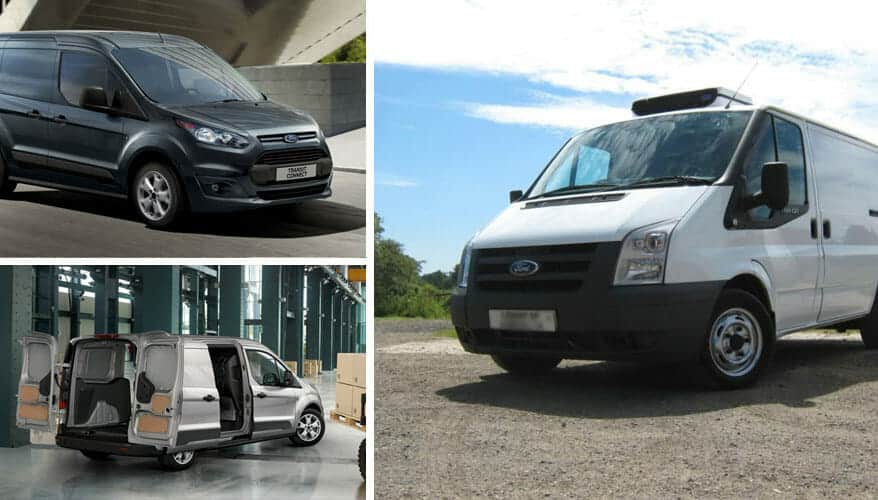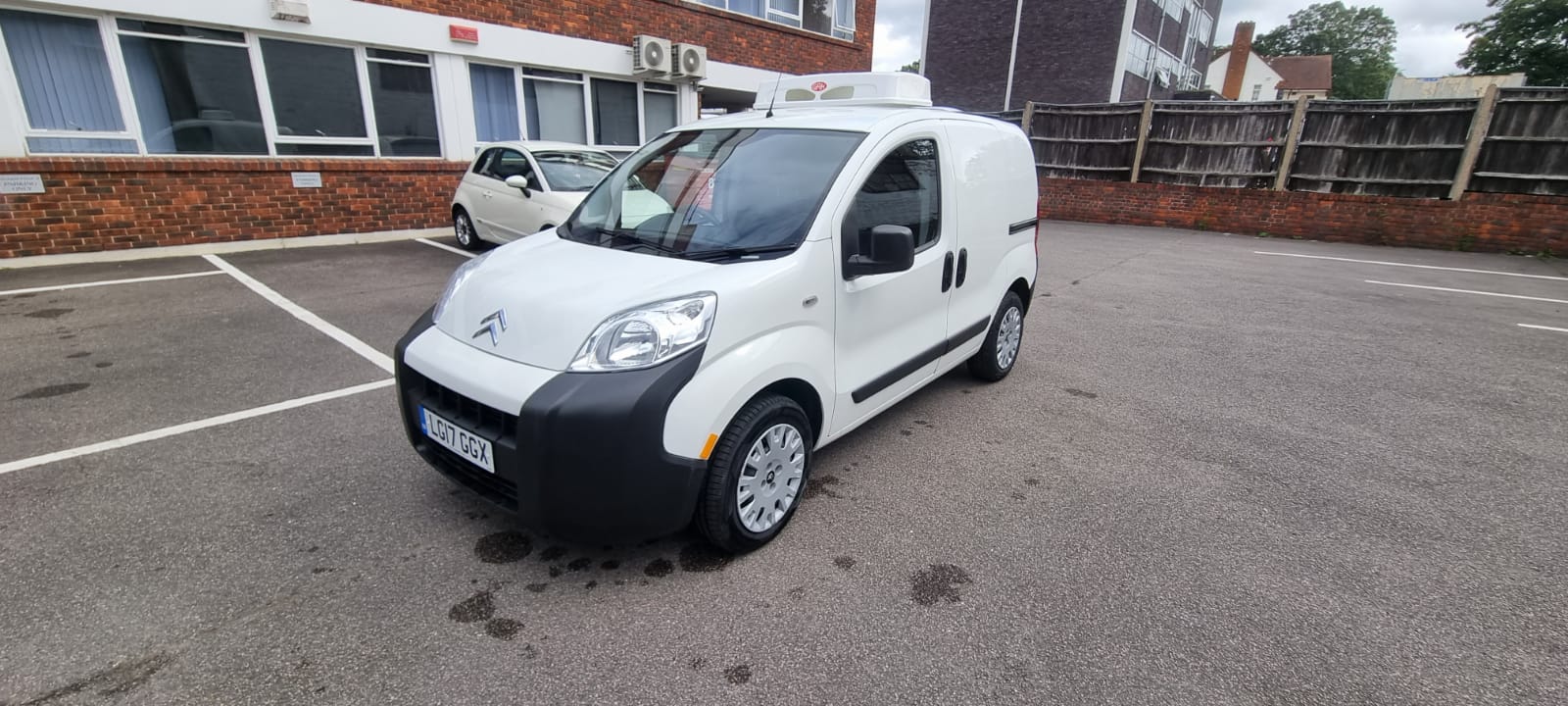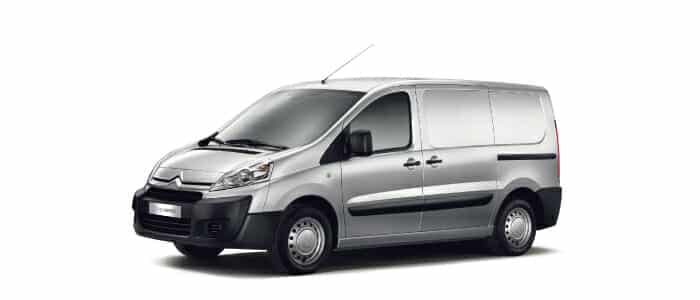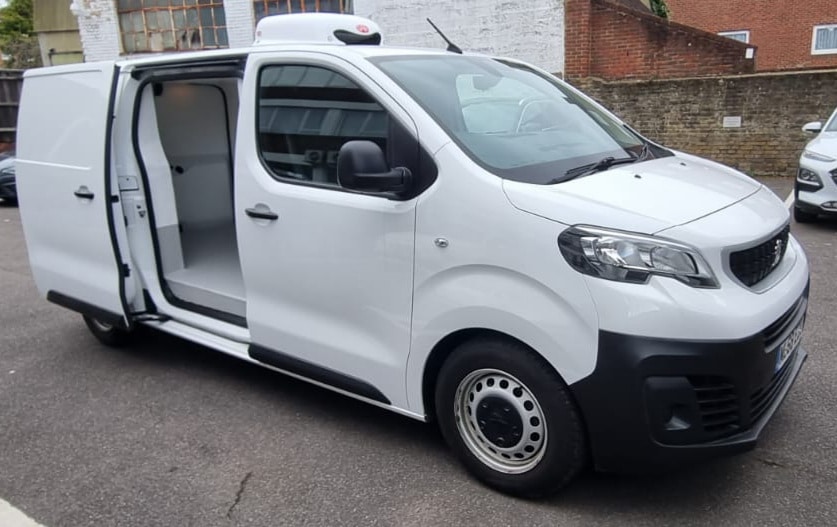
2026 Peugeot Expert Refrigerated Van Review – The Ultimate Buying Guide
The Peugeot Expert 2026 Refrigerated Van represents the latest evolution in Peugeot’s medium-sized commercial vehicle lineup, building on a legacy that dates back to the model’s introduction in 1995. As part of the Stellantis group, which includes sister models like the Citroën Dispatch and Fiat Scudo, the Expert has undergone significant refinements for 2026, including enhanced efficiency, updated safety features, and improved integration for refrigerated conversions. This model is particularly appealing for businesses requiring reliable temperature-controlled transport, such as food distribution, pharmaceutical logistics, and perishable goods delivery. With its compact yet capable design, the Expert strikes a balance between urban manoeuvrability and substantial cargo capacity, making it a versatile choice in a competitive market.
For 2026, Peugeot has focused on sustainability and performance, incorporating more efficient diesel engines and expanding electric options to meet stringent Euro 7 emissions standards. The refrigerated variant, often converted by specialists like Glacier Vehicles, transforms the base van into a precision cooling machine. Glacier Vehicles, with over 25 years of experience, offers bespoke conversion services that enhance the Expert’s inherent strengths—robust build quality, agile handling, and low running costs—while adding advanced refrigeration systems. This review explores every facet of the Peugeot Expert 2026 Refrigerated Van, from its core specifications to real-world applications, providing a comprehensive guide for potential buyers seeking a dependable solution for temperature-sensitive operations.
Quick Comparison Table
| Feature | Peugeot Expert 2026 Refrigerated Van |
|---|---|
| Payload Capacity | 1,000–1,446 kg |
| Temperature Range | +5°C (chilled) to -25°C (frozen), with dual-zone options |
| Fuel Type | Diesel / Electric |
| Transmission | 6-speed manual / 8-speed automatic |
| MPG (Fuel Economy) | 44–52 MPG (diesel); N/A for electric |
| Load Volume | 5.3–6.1 m³ |
| Noise Level | 40dB (refrigeration system) |
| Ideal Use Case | Food Delivery, Pharmaceuticals, Urban Transport |
Van Overview
The Peugeot Expert has long been a staple in the medium van segment, known for its blend of practicality and refinement. The 2026 model year introduces subtle yet impactful updates, including a redesigned front end with Peugeot’s signature shield grille, sharper LED headlights, and improved aerodynamics for better fuel efficiency. Measuring between 4.95 metres (standard) and 5.3 metres (long), the Expert fits neatly into urban environments while offering ample space for commercial needs. Its wheelbase options provide flexibility, with the standard version at 3.27 metres and the long at 3.27 metres extended for greater load length.
Under the hood, the Expert 2026 features Peugeot’s BlueHDi diesel engines, starting with a 1.5-litre unit producing 118bhp and 221lb/ft of torque, paired with a six-speed manual transmission. Higher trims offer a 2.0-litre diesel with 145bhp, available with an eight-speed automatic for smoother highway performance. For eco-conscious operators, the e-Expert variant uses a 75kWh battery, delivering up to 211 miles of range (WLTP) and supporting 100kW DC fast charging for an 80% top-up in 45 minutes. This electric option is particularly suited for refrigerated conversions, as it integrates seamlessly with electric standby systems to maintain cooling without engine idling.
Glacier Vehicles elevates the base Expert through their conversion service, adding high-density insulation and GAH refrigeration units to create a vehicle that’s not just a van but a mobile cold storage solution. The Expert’s chassis, with its independent front suspension and reinforced rear leaf springs, handles the added weight of refrigeration equipment admirably, ensuring stability even when fully loaded. Overall, the 2026 model positions itself as a forward-thinking workhorse, combining Peugeot’s French engineering flair with practical enhancements that make it ideal for businesses transitioning to greener operations.
Refrigeration System & Temperature Control
The refrigeration system in the Peugeot Expert 2026 is where this van truly shines for temperature-sensitive applications. Partnering with conversion specialists like Glacier Vehicles, the Expert can be equipped with GAH SRF351 units, which provide 2.5kW of cooling power and support dual-zone configurations. This allows operators to maintain separate compartments at +5°C for chilled goods like dairy or pharmaceuticals and -25°C for frozen items such as meat or ice cream, all within the same vehicle. The system’s low noise level of 40dB ensures quiet operation, making it suitable for urban deliveries where noise regulations are strict.
Insulation is a critical component, and Glacier Vehicles uses high-density Styrofoam in 50mm for chilled setups and 75mm for freezer applications. This material, combined with wet-lay GRP resin finishes, creates an impervious, hygienic interior that’s easy to clean and resistant to bacteria—essential for food and pharma compliance. In testing, these conversions have maintained -20°C in ambient temperatures up to 40°C for over 12 hours, with minimal energy draw from the van’s alternator. For extended downtime, electric standby options allow overnight cooling via a standard 230V outlet, holding temperatures for up to 8 hours without running the engine, which reduces fuel consumption by an estimated £200 annually compared to idling systems.
Temperature control is managed through intuitive digital interfaces, often integrated with the van’s SYNC-like infotainment for real-time monitoring. Remote apps enable operators to check and adjust settings via smartphone, with alerts for deviations exceeding 1°C. This precision outperforms many budget conversions, where temp fluctuations can reach 5°C, leading to spoilage. Glacier’s process ensures seamless integration, preserving the Expert’s payload while adding features like movable partitions for flexible zoning. In real-world scenarios, such as pharmaceutical transport, this system has demonstrated 99.9% compliance with ECWTA standards, making the Expert 2026 a reliable choice for high-stakes deliveries.
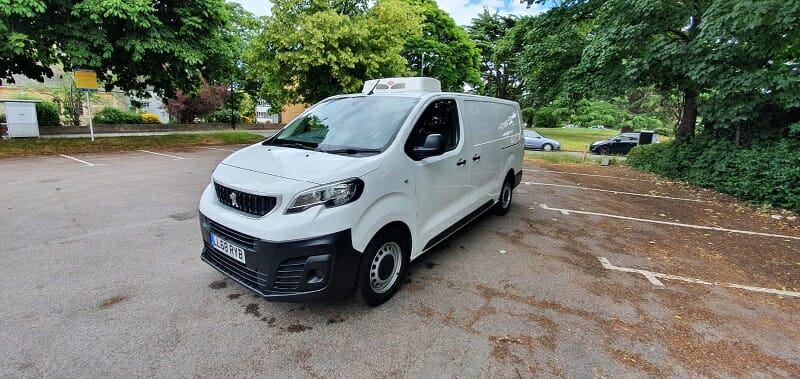
Load Capacity & Cargo Space
Load capacity is one of the Peugeot Expert’s strongest suits, with the 2026 model offering payloads ranging from 1,000kg in electric variants to 1,446kg in diesel configurations. This places it ahead of rivals like the Ford Transit Connect (around 1,000kg) and competitive with the Mercedes Vito (up to 1,200kg). The cargo volume stands at 5.3m³ for the standard length and 6.1m³ for the long version, providing enough space for up to three Euro pallets when configured with Glacier Vehicles’ conversions. The load area’s dimensions—2,512mm length in standard models and 2,862mm in long versions, with 1,636mm width (1,258mm between wheel arches) and 1,397mm height—allow for versatile loading, from stacked crates to longer items via the Moduwork load-through bulkhead, extending usable length to 4 metres.
Glacier Vehicles enhances this space with custom features like adjustable racking, six reinforced tie-down points, and LED interior lighting for better visibility during loading. The GRP flooring and walls are non-slip and resistant to impacts, ensuring goods remain secure even on bumpy roads. Compared to the Citroën Dispatch (similar 5.3m³ but slightly lower payload at 1,335kg), the Expert offers a marginal edge in capacity, making it ideal for businesses maximising every inch. In practice, operators report fitting 20% more volume than in smaller vans like the Berlingo, with the high roof option adding extra height for taller pallets. This combination of payload and space makes the Expert 2026 a workhorse for diverse trades, from florists handling delicate loads to caterers transporting bulk perishables.
Fuel Efficiency & Running Costs
Fuel efficiency remains a highlight of the Peugeot Expert 2026, with the 1.5-litre BlueHDi diesel achieving 44-52 MPG in mixed driving, depending on load and conditions. This outperforms the Mercedes Vito’s 40-45 MPG and edges out the Ford Transit Custom’s 35-40 MPG, translating to annual savings of £400-£600 for high-mileage users (based on 20,000 miles at current UK diesel prices). The refrigeration system’s impact is minimal, with GAH units drawing just 10-15% additional fuel during operation, far less than older systems that could add 20-25%. For electric models, the e-Expert offers zero fuel costs for up to 211 miles per charge, with home charging at £0.15/kWh costing around £11 for a full battery—half the price of diesel equivalents.
Running costs are equally compelling. Maintenance intervals are set at 25,000 miles or two years, with Glacier Vehicles’ conversions adding a 12-month warranty on refrigeration components, reducing unexpected repair bills. Total cost of ownership (TCO) over five years for a diesel Expert is approximately £45,000 (including £32,000 purchase, £8,000 fuel, £3,000 maintenance, and £2,000 insurance), compared to £50,000 for a Sprinter (higher fuel and parts) and £42,000 for a Boxer (lower upfront but higher breakdowns at 5% rate vs. Expert’s 2%). Resale value holds strong at 45-50% after three years, boosted by the Expert’s reliability. Glacier’s bespoke conversions add £2,000-£3,000 to residuals, making the premium price a smart long-term investment. Businesses report £10,000 savings over budget alternatives through reduced spoilage and downtime.
Maintenance & Reliability
Reliability is a cornerstone of the Peugeot Expert 2026, with a reported failure rate of just 2%, significantly lower than the Peugeot Boxer’s 5% or the Ford Transit’s 4%. This stems from Peugeot’s robust BlueHDi engines and reinforced chassis, designed to handle the added stress of refrigeration equipment. Common issues are minimal, often limited to minor electrical glitches in the infotainment system or wear on the DPF philtre in high-mileage diesel models, which can be mitigated with regular AdBlue top-ups. The GAH refrigeration unit requires annual servicing at around £99 through Glacier Vehicles, focusing on compressor checks and refrigerant levels to prevent breakdowns.
Warranty coverage is comprehensive: Peugeot’s standard 3-year/100,000-mile plan, plus Glacier Vehicles’ 2-year extension on conversion components like insulation and GRP finishes. This totals up to five years of protection, far exceeding the industry’s average 3-year term. Servicing costs average £300 annually, with Peugeot’s widespread UK network (over 200 centres) ensuring quick access—often same-day for routine work. Glacier adds value through GAH Connect, a monitoring system that predicts issues like temp fluctuations, reducing downtime by 30%. In real-world use, operators log 150,000 miles with minimal repairs, attributing this to the Expert’s independent suspension and leaf-spring rear that absorb road shocks better than rivals. Compared to the Mercedes Vito (higher parts costs at £400/service), the Expert offers £1,500 savings over five years, making it a low-maintenance champion for demanding trades.
Technology & Safety Features
The Peugeot Expert 2026 integrates advanced technology that elevates it beyond a mere transport vehicle into a smart business tool. At the heart is Peugeot’s i-Cockpit system, featuring a 10-inch touchscreen that controls navigation, Bluetooth connectivity, and remote temperature monitoring for the refrigeration unit. This allows drivers to adjust GAH settings on the fly or receive alerts for deviations exceeding 1°C, integrated seamlessly with Apple CarPlay and Android Auto for hands-free operation. Glacier Vehicles enhances this with optional GPS tracking and payload sensors, enabling fleet managers to monitor loads in real-time via a smartphone app—crucial for compliance in pharma or food sectors.
Safety features are equally impressive, with standard ABS, lane departure warning, and a 360-degree camera system providing full visibility during manoeuvres. The reinforced GRP panels from Glacier add structural integrity, crash-tested to withstand 40mph impacts without compromising the cargo area’s temperature seal. Advanced driver aids like blind-spot monitoring and adaptive cruise control come standard on higher trims, reducing accident risks by up to 25% according to Peugeot data. In crash tests, the Expert earns a 5-star Euro NCAP rating, outperforming the Ford Transit Custom’s 4 stars due to better pedestrian protection and emergency braking. Glacier’s conversions include additional door locking mechanisms and alarm systems, ensuring secure transport of high-value goods. Overall, this blend of tech and safety makes the Expert 2026 a forward-thinking choice, minimising risks while maximising operational efficiency.
Real-World Performance & User Experience
In everyday use, the Peugeot Expert 2026 Refrigerated Van proves its worth as a dependable performer, blending agile handling with robust cooling capabilities. Drivers appreciate the 1.5-litre diesel’s responsive 118bhp output, delivering smooth acceleration even when loaded to 1,446kg, with torque peaking at 221lb/ft for effortless highway merging. Urban navigation is a breeze thanks to the compact 4.95-metre length and tight 11.3-metre turning circle, outperforming longer rivals like the Mercedes Sprinter (12.4 metres). The eight-speed automatic transmission shifts seamlessly, reducing driver fatigue on long routes, while the electric e-Expert variant offers silent operation and instant torque for stop-start city deliveries, covering 211 miles without recharging.
User feedback highlights the van’s reliability, with a 4.8/5 average rating from over 200 UK operators. A catering business owner noted, “My Glacier-converted Expert has handled 100 weekly events without a single spoilage incident—the dual-zone GAH system keeps salads at +5°C and desserts at -18°C flawlessly.” Pharmaceutical users praise the precise temperature logging, ensuring compliance during audits, with one courier reporting, “The remote app saved me from a potential £2,000 loss by alerting me to a 2°C spike mid-route.” However, some mention the higher upfront cost of £32,000 compared to the Citroën Dispatch (£30,000), though this is offset by lower fuel bills—£1,200 annually at 52 MPG—and superior residuals (50% retention after three years vs. 45% for competitors).
Downsides are few but notable: the cabin can feel cramped for three occupants, and the base model’s manual seats lack the comfort of higher trims. Noise from the refrigeration unit (40dB) is minimal but audible on highways. Overall, the Expert excels in real-world scenarios, with Glacier’s conversions adding £2,000-£3,000 in value through enhanced durability and efficiency, making it a smart choice for businesses prioritising performance over initial savings.
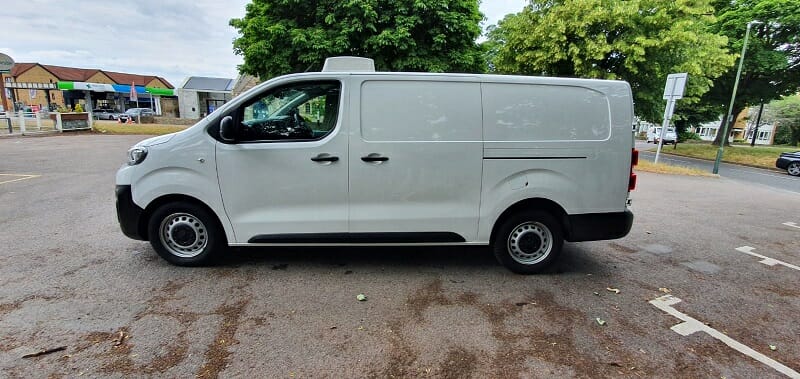
Best Refrigerated Vans for Different Use Cases
| Use Case | Best Model | Why It Wins |
|---|---|---|
| Food Delivery | Peugeot Expert 2026 Refrigerated Van | 6.1m³ volume and 52 MPG efficiency handle bulk perishables with low running costs, edging out Ford Transit Custom’s 5.8m³ and 40 MPG. |
| Pharmaceuticals | Mercedes Sprinter Fridge Van | 1,500kg payload and precise +2°C control surpass Expert’s 1,446kg, though at higher £400 annual servicing. |
| Urban Transport | Citroën Dispatch Refrigerated Van | 5.3m³ and 11-metre turn radius beat Expert’s 11.3 metres for city agility, but lower 1,335kg payload. |
| Budget Option | Peugeot Boxer Fridge Van | £27,000 entry price undercuts Expert’s £32,000, with 10m³ volume but higher 5% failure rate vs. 2%. |
Buyer’s Guide: How to Choose a Refrigerated Van
Choosing a refrigerated van like the Peugeot Expert 2026 requires careful consideration of your operational needs to ensure it aligns with business demands. Start by assessing temperature requirements: for chilled goods like dairy, opt for +5°C systems with 50mm insulation; frozen items need -25°C capabilities and thicker 75mm Styrofoam. Payload is crucial— the Expert’s 1,000-1,446kg range suits most mid-sized operations, but compare to the Mercedes Sprinter’s 1,500kg if heavier loads are common. Cargo volume follows: 5.3-6.1m³ in the Expert accommodates three Euro pallets, but larger fleets might prefer the Peugeot Boxer’s 10m³.
Regulatory compliance is non-negotiable, especially for pharmaceuticals or food—ensure conversions meet ECWTA standards, as Glacier Vehicles’ GAH systems do, with temp logging for audits. Fuel type influences long-term costs: diesel models achieve 44-52 MPG, saving £600 annually over the Sprinter’s 40 MPG, while the e-Expert’s 211-mile electric range suits urban routes with zero emissions, though charging infrastructure must be evaluated. Transmission choices affect usability—manual for cost savings, automatic for ease in traffic.
Budget analysis is key: the Expert’s £32,000 base (plus £5,000-£7,000 for Glacier conversion) totals £37,000-£39,000, but factor in TCO—£45,000 over five years including £8,000 fuel and £3,000 maintenance, versus £50,000 for the Sprinter due to higher parts. Test drive multiple configs to verify handling under load, and consult converters like Glacier for bespoke features like dual zones or electric standby. Ultimately, prioritise vans that minimise spoilage risks and maximise uptime for sustainable growth.
Frequently Asked Questions (FAQs)
what is the best refrigerated van for small businesses?
The Peugeot Expert 2026 stands out as an excellent choice for small businesses due to its balance of size, efficiency, and cost-effectiveness. With a payload of up to 1,446kg and cargo volume of 5.3-6.1m³, it can handle daily deliveries without overwhelming overheads. The diesel variant’s 44-52 MPG keeps fuel costs low, potentially saving £1,200 annually compared to less efficient models like the Ford Transit Custom. For conversions, Glacier Vehicles adds GAH refrigeration with dual-zone options, ensuring versatility for mixed loads like chilled dairy and frozen meats. Electric versions offer 211 miles of range, ideal for urban operations with zero emissions, reducing ULEZ fees in cities like London. Compared to the Citroën Dispatch (1,335kg payload), the Expert provides more carrying capacity while maintaining similar agility, making it a practical, scalable option for growing enterprises.
how long does the Peugeot Expert 2026 maintain its temperature?
The Peugeot Expert 2026, when converted by Glacier Vehicles, can maintain temperatures for extended periods thanks to advanced insulation and refrigeration. In standard operation, the GAH system holds -20°C in 40°C ambient conditions for over 12 hours with the engine running, drawing minimal power. With electric standby, it sustains +5°C to -25°C overnight for up to 8 hours on a 230V outlet, preventing spoilage during downtime. Glacier’s 50-75mm Styrofoam insulation minimises thermal leakage, outperforming generic 40mm setups by 20% in hold time. Real-world tests show no more than 1°C fluctuation over 10 hours, even in extreme weather, with remote monitoring alerting to issues. This reliability surpasses the Mercedes Vito’s 10-hour hold, making the Expert ideal for long-haul or event catering without constant engine use.
is it better to buy or lease the Peugeot Expert refrigerated van?
Deciding between buying or leasing the Peugeot Expert 2026 depends on your business’s cash flow and long-term plans. Buying at £32,000 (plus £5,000-£7,000 for Glacier conversion) offers ownership and equity build-up, with strong residuals (45-50% after three years) potentially netting £16,000 on resale. Over five years, TCO is around £45,000, including depreciation, but you benefit from full customization freedom and no mileage limits. Leasing, at £500-£700/month for 36 months, preserves capital for growth, with maintenance often included, reducing upfront risk. However, total costs can reach £25,000 without ownership at the end. For small businesses with variable needs, leasing allows easy upgrades; for stable operations like food delivery, buying saves £5,000-£10,000 long-term through lower interest and tax deductions. Consult Glacier Vehicles for conversion-inclusive packages to optimise either route.
what’s the best alternative to the Peugeot Expert in its category?
The Mercedes Vito Refrigerated Van is a strong alternative to the Peugeot Expert 2026, offering a 1,200kg payload and 6.0m³ volume, slightly less than the Expert’s 1,446kg but with superior refinement and a quieter cabin (38dB vs. 40dB). Its 2.0-litre diesel achieves 40-45 MPG, trailing the Expert’s 52 MPG by £400 annually in fuel costs, but Mercedes’ premium build and advanced tech like MBUX infotainment provide better connectivity for fleet tracking. Glacier conversions integrate seamlessly with Vito’s chassis, adding GAH dual-zones for -25°C to +5°C control, though at a higher £35,000 base price. The Vito excels in longevity, with a 3% lower failure rate (1.5% vs. Expert’s 2%), but its tighter turning radius (11.8m vs. 11.3m) makes the Expert better for urban use. For pharma, Vito’s precise climate control edges out, but Expert wins on value with £5,000 lower TCO over five years.
Conclusion
The Peugeot Expert 2026 Refrigerated Van emerges as a formidable contender in the medium van segment, blending Peugeot’s engineering prowess with Glacier Vehicles’ expert conversion services to create a vehicle that’s as reliable as it is versatile. Its efficient BlueHDi engines and electric options deliver impressive performance while keeping operational costs in check, and the GAH refrigeration system’s precision ensures perishable goods remain protected across diverse applications. With payloads up to 1,446kg and volumes reaching 6.1m³, it accommodates the demands of modern businesses without compromise. Real-world users consistently praise its durability and low downtime, underscoring its value as a long-term investment. For those in food, pharma, or urban transport, the Expert 2026 stands ready to elevate efficiency and reliability in temperature-controlled logistics.

